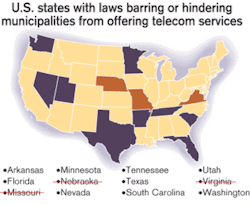In the case of Nixon vs. Missouri Municipal League, the U.S. Court of Appeals for the 8th Circuit in August 2002 overturned an existing Missouri law that barred municipalities and municipal electric utilities from providing retail or wholesale telecommunications services. Now, Missouri Attorney General Jeremiah W. Nixon, the Federal Communications Commission, and Southwestern Bell (a subsidiary of SBC) are seeking to reverse the 8th Circuit's decision. The decision could have significant ramifications for the fiber to the home (FTTH) industry since municipalities have been among the technology's early adopters.
The U.S. Supreme Court will hear the case in the first quarter of next year. At the heart of the debate is Section 253(a) of the Telecommunications Act of 1996, which reads: "No state or local statute or regulation, or other state or local legal requirement, may prohibit or have the effect of prohibiting the ability of any entity to provide any interstate or intrastate telecommunications service."
The argument hinges on the definitions of the words "any" and "entity." Did Congress intend to include municipalities and municipally owned utilities?
At the Supreme Court hearing, Atty. Gen. Nixon, the FCC, and Southwestern Bell (the petitioners) will argue that Section 253(a) usurps the states' right or authority to define their own administrative and political structures. The Constitution delineates a separation between the states and the federal government, "but it only works if the states retain some areas of sovereignty, areas that Congress cannot penetrate," writes Nixon in the Petitioner's Brief. "The ability of states to define the authority of their own political subdivisions is such an area."
In a petition filed separately, Southwestern Bell asserts that the word "entity" "connotes a thing with a 'distinct and independent existence'—a criterion that is not met by political subdivisions that are wholly dependent on the state for their continued existence."
The petitioners cite the 1991 decision of Gregory vs. Ashcroft, in particular the "plain-statement rule," which asserts that the court should not interpret a federal statute in such a way that the interpretation intrudes upon an area traditionally regulated by the states without a "clear expression" of congressional intent. "Under Gregory, if a federal statute is subject to 'broad' and 'narrow' construction, it must be read narrowly so as to avoid intruding on traditional state prerogatives," contends Southwestern Bell.
The respondents—Missouri Municipal League et al.—believe "the Gregory presumption applies only when a statute is ambiguous, and Section 253(a) is not ambiguous." They will argue that municipalities are, "in the ordinary English usage of the term, unquestionably 'entities'...municipalities can sue or be sued; they can enter into contracts and own property. For many purposes, federal law treats municipalities differently from states." The respondents assert that Congress meant the term "any entity" to be as inclusive as possible.
The ruling should affect more than Missouri. Nine U.S. states currently have laws barring or hindering municipalities from offering telecommunications services, including Arkansas, Florida, Minnesota, Nevada, Tennessee, Texas, South Carolina, Utah, and Washington.
If it finds in favor of the Missouri Municipal League, the Supreme Court will clear the way for municipalities in these nine states to fight to overturn the existing laws. If the Supreme Court rules in favor of the incumbent carriers, these existing laws will be upheld. Whatever the outcome, the Supreme Court's ruling will alter the landscape of the municipal telecom space.
For the time being, the incumbent carriers are more concerned with the competition they face from the FCC's recent unbundled network elements (UNE) ruling and the possibility of cable multiple-system operators (MSOs) entering the market for voice services, explains Leonard Ray, chairman of the Government Relations Committee of the FTTH Council. Despite accounting for nearly half of all the FTTH deployments in the United States, municipalities have yet to receive the RBOCs' "full-court press," he says. "If [the incumbents] get what they want on UNE and if the cable MSOs don't begin to pressure them on voice, then they will move the full force of their lobbying efforts against the municipalities on this particular issue."In a show of solidarity, Verizon, BellSouth, and CenturyTel, along with the United States Telecom Association, filed an amici curiae, or "friends of the court," in support of the petitioners. Sprint has filed a separate amici brief.
Meanwhile, 10 amici briefs were filed in support of the Missouri Municipal League, which represents more than 600 cities, towns, and villages. The FTTH Council and High-Tech Broadband Coalition filed a joint brief because they believe that "municipalities are a huge catalyst for the emergence of FTTH," explains Ray. "Without the municipalities doing what they've done, there would be no RBOC RFP—because there simply wouldn't be equipment for them to evaluate. The industry and the consumers owe a lot to municipalities."
"It is vital to the competitiveness and well-being of our nation for municipalities to help bring truly high-bandwidth broadband to all Americans as rapidly as possible, particularly in unserved and underserved rural areas," adds the American Public Power Association (Washington, DC) in its amici brief in support of the municipalities.The Supreme Court has decided to hear the case because of a lack of unanimity in the decisions already handed down on the issue. Of the four previous decisions, three court decisions found in favor of the municipalities (Lincoln Electric System vs. Nebraska Public Service Commission and Nebraska Telecommunications Association et al.; City of Bristol, VA, vs. Mark L. Earley, Attorney General et al.; and the 8th Circuit's ruling in Nixon vs. Missouri Municipal League), while one ruled against them (City of Abilene, TX, vs. the FCC).

